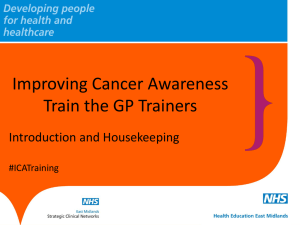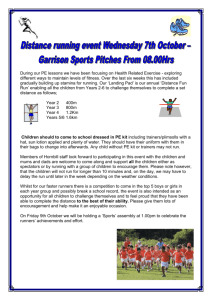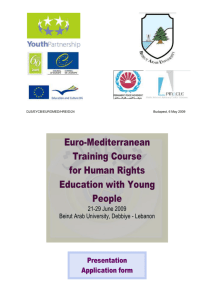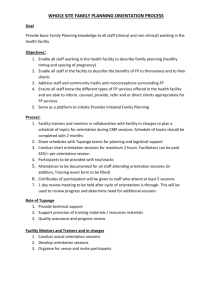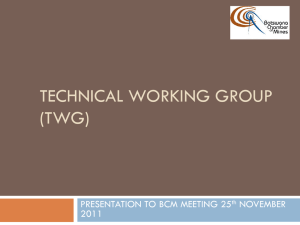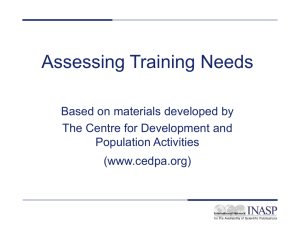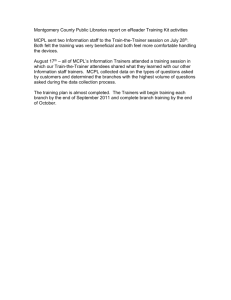Human Rights Education - salto
advertisement
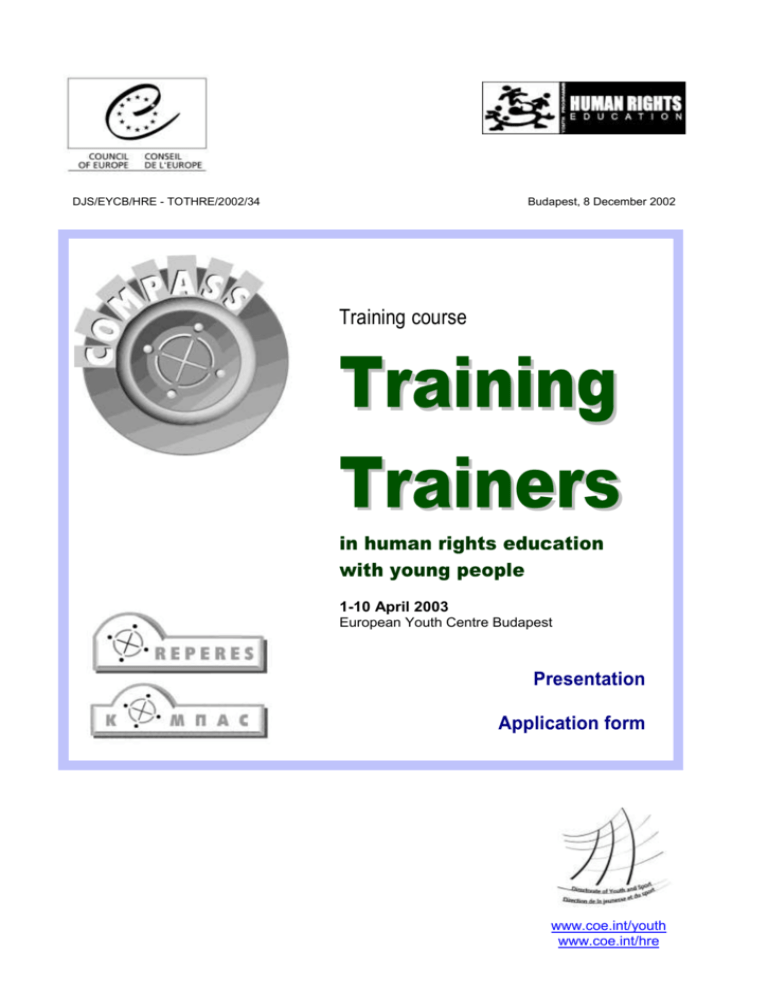
DJS/EYCB/HRE - TOTHRE/2002/34 Budapest, 8 December 2002 Training course T r ai ni n g T r ai ne r s in human rights education with young people 1-10 April 2003 European Youth Centre Budapest Presentation Application form www.coe.int/youth www.coe.int/hre Training for Human Rights Education Human rights education (HRE) – understood as educational programmes and activities that focus on promoting equality in human dignity – is of incalculable value in the shaping of a European dimension of citizenship meaningful to all Europeans. Those involved in non-formal education in youth work should also consider the evolution, practice and challenges of human rights, with regard to their universality, indivisibility and inalienability, and what they mean to the young people of today. The Directorate of Youth and Sport of the Council of Europe has acquired an undisputed reputation for and expertise in developing educational approaches and materials suitable to both formal and non-formal contexts as well as to different cultural environments. Its work with multipliers, the impact of projects such as the “all different – all equal” youth campaign, and its long-term training programme have all contributed to the development of projects that make their impact first and foremost at grass-roots level while being pre-eminently European. For many of the “traditional” partners of the Directorate of Youth and Sport, human rights education has provided the background and values for their projects and activities while being a constant, though not explicit, element in what they do. Among the new groups reached by the activities of the Directorate of Youth and Sport are many which work specifically or more generally in the field of human rights and which now have further possibilities of consolidating their relationship with the Council of Europe. Today, in view of recent events that threaten the foundations of a culture of peace and human rights, a more visible, explicit and conscious approach to human rights education is required and needed. The experiences acquired during the past two years with the Human Rights Education Youth Programme confirm that the success of European educational projects of this kind depends on: The provision of appropriate and accessible educational methodologies and tools (such as the Education Pack “all different-all equal”, Domino and COMPASS); The availability of such materials in the national languages of the users; The existence of trainers and multipliers who, at national and regional level, can act as resource persons and train local multipliers (youth leaders and youth workers, teachers and other educators). With this in mind, the Directorate of Youth and Sport has produced COMPASS - a manual on human rights education with young people. COMPASS presents background concepts essential to human rights education as well as practical activities and methods for use in both formal and nonformal education contexts. Building on accumulated experience of non-formal education and youth work, the manual is based on learner-centred approaches and provides a framework for developing young people’s skills, competencies and attitudes related to human rights education. The first training of trainers in HRE with young people was held in 2002. Participants in that course have remained active in implementing regional and national training and disseminating activities on COMPASS and HRE. The 2003 course is meant to sustain these achievements by extending the number of trainers involved and supporting other national and regional training courses in 2003 and 2004. As an additional follow-up, an advanced training course for trainers is being considered for 2004 or 2005. 2 Aims of the course This course aims to develop the competence of trainers in working with human rights education at national and regional level and to enable them to act as trainers or multipliers for human rights education, especially through national or regional training courses organised by partners of the Directorate of Youth and Sport and in using COMPASS. Objectives To develop the trainers’ knowledge and competence in key concepts of human rights education with young people; To familiarise the participants with the approaches and activities of COMPASS (the manual on human rights education with young people) and with how best to use it and adapt it to local contexts and realities; To review and address the essential competencies, skills and attitudes for trainers working with human rights education; To design modules for training trainers and multipliers at national level; To explore the specificities and points of commonality of the non-formal and the formal education contexts in relation to human rights education: To prepare activities for disseminating COMPASS at national and local level; To contribute to the development of a pan-European network of trainers on human rights education with young people. Methodology and Programme The course is designed to give participants the opportunity to experience and reflect upon activities and concepts central to human rights education based on experiential learning approaches. The course is also designed as a mutual learning situation, where participants can compare their approaches to training and to human rights education across Europe in a dialogical intercultural approach and environment. Contributions from experts in the field of human rights will establish a theoretical framework and a common reference point for learning and communication, and there will be an opportunity to try out and evaluate some of the activities in COMPASS. Towards the end of the course, multicultural groups of participants will design modules for training courses at national or regional level. A diversity of working methods will be used for learning about human rights and the approaches proposed in COMPASS. The previous experience of participants, as trainers or educators, will be the starting point of the programme and of the learning process. The programme of the course will include: A review of the evolution of human rights education in Europe and the present challenges that it faces; An introduction to the approaches and structure of COMPASS, the manual on human rights education with young people; An introduction to the key instruments and activities of the Council of Europe in the field of human rights and human rights education; An analysis of the competencies, skills and values of trainers working with human rights education; Opportunities to share experiences and challenges of developing human rights education in formal and in non-formal education settings; 3 Practical workshops on skills and attitudes essential to human rights education; Opportunities to experiment with and to evaluate different methods and activities found in COMPASS. Opportunities to design possible training modules for national and regional courses to be run by participants. Profile of the participants This course is designed for participants who are or act as: Trainers active in non-formal education, especially within youth organisations and associations, in youth work activities and in other NGOs concerned with human rights education; Trainers and multipliers active within formal education systems. All participants should: - Already have experience and in working as trainers and educators with young people; - Be able and committed to act as multipliers or trainers for human rights education; - Be motivated to develop their knowledge and competence in human rights education and to share their experiences with other participants; - Be able to work in English, French or Russian;1 - Be committed to attend for the full duration of the course and be supported by an organisation, institution or service. Priority will be given to applicants who will be trainers in the courses planned for national or regional level within the Human Rights Education Youth Programme. Team of trainers The programme of the course is designed and conducted by a multicultural team of experienced trainers active within the Directorate of Youth and Sport’s trainers’ pool. They will be supplemented by resource experts for specific parts of the course. Application procedure and selection of participants All candidates must apply using the enclosed application form. Applications should be sent to the European Youth Centre Budapest together with a letter of support from their sending organisation or institution stating the added value for the organisation resulting from the applicant’s participation in the course. The preparatory team will select forty participants on the basis of the profile outlined above and ensuring a balanced group (gender, geographical regions, different types of experiences, cultural backgrounds and organisations). A waiting list may be established. Candidates will be informed about whether their application has been accepted or rejected, and if they have put on the waiting list, by the end of February 2003. The accepted candidates will receive the course documentation directly from the European Youth Centre Budapest. Deadline for applications The application form must be sent to the EYC Budapest by 1 February 2003. 1 The course will be held in English and French or Russian with simultaneous interpretation. The choice of the second language will be made upon the needs of the participants invited to the course. We therefore welcome applications from people who are able to work in one of these three languages. 4 Financial and practical conditions of participation Travel expenses Travel expenses and visa fees are reimbursed (on presentation of the relevant receipts) according to the rules of the Council of Europe. Only the participants who attend the entire training course can be reimbursed. The payment will be made either by bank transfer after the course, or at the end of the course in cash (in Euros). Accommodation Board and lodging will be provided and paid for by the Council of Europe at the European Youth Centre Budapest. Enrolment fee An enrolment fee of 54 Euros is payable by each participant. This amount will be deducted from the amount to be reimbursed for travel expenses or paid at the EYCB during the course. Compensation for cost of living The Directorate of Youth and Sport operates a system of compensation for cost of living for young workers and young unemployed who are obliged to take unpaid leave in order to attend one of its activities, and for young unemployed people. Further details will be sent at a later stage to those participants who have been accepted. The Human Rights Education Youth Programme 2003 -2005 The continuation of the Human Rights Education Youth Programme has been confirmed for three years (2003-2005), with a programme of activities that includes a particular emphasis on the work against racism and discrimination and on social cohesion. In addition to this training course, the Human Rights Education Youth Programme provides several opportunities for participation and involvement in 2003, such as: - National and regional training courses in human rights education with young people; - Support for local pilot projects; - Recognition of relevant local projects; - Translation and dissemination of COMPASS in different national contexts. - Activities on ways of involving young people in addressing violence in everyday life. For further information and details about any of these possibilities, please contact the EYCB secretariat (eycb.secretariat@coe.int) or consult our web site http://www.coe.int/hre Other Training Courses of the Directorate of Youth and Sport If you are interested in a training course in international youth work, but your profile does not fully correspond with the requirements of this course, please note that the Directorate of Youth and Sport organises other training courses, including: - Introduction to organising international youth activities - Training of trainers in international youth work; - Training of youth workers for Euro-Med youth projects - Training courses within the framework of the Training Partnership of Council of Europe and the European Commission. Further information about these courses can be obtained from the Directorate of Youth and Sport Secretariat (http://www.coe.fr/youth or http://www.eycb.coe.int). European Youth Centre Budapest Zivatar utca 1-3. H-1024 BUDAPEST, Hungary Fax: + 36 1 212 40 76 Tel: + 36 1 438 1030 Email: eycb.secretariat@coe.int www.coe.int/hre 5 Training Trainers In Human Ri ghts Education EYC Budapest, 1-10 April 2003 APPLICATION FORM Please type or use CAPITAL letters and write legibly. If necessary, please attach an extra sheet . I. INFORMATION ON THE APPLICANT 1. Name: Sex: Male/Female Age: Nationality: Working languages (please specify all your working languages): English French Russian Others (specify): Main profession or occupation: 2. Contacts – Please note that all correspondence will be sent to this address, so please ensure it is complete! Postal address (street, number, city, postal code, country): Telephone: Telefax: Mobile telephone: e-mail: II. INFORMATION ON THE ORGANISATION/INSTITUTION 3. Sending organisation/institution Name: Postal address: Telephone: Telefax: e-mail: Internet address: Please describe briefly the scope and main activities of the organisation/institution and its relation to human rights education: 4. Your organisation/institution is… an International youth organisation a national youth council a national youth organisation a local/regional youth organisation a governmental institution a formal education institute a National Agency of the “Youth” programme a Human Rights association a minority or minority rights association other (please specify): ………..…………………………………………… 5. What is your function or role in the organisation/institution? 6 III. EXPERIENCE AS A TRAINER 6. In what capacity are you involved in training, youth work or human rights education? Full time free-lance trainer Full time (employed) trainer Teacher Part-time free-lance trainer Volunteer Teacher trainer Occasional trainer Youth worker Other (please specify): 7. What kind of education and training activities are you involved in? (Please indicate briefly the target groups and themes or aims of the activities) 8. What type of training have you received in youth work or human rights education? 9. Have you applied for, or attended, any other training course of the Directorate of Youth and Sport or of any other service of the Council of Europe in the past two years? (If yes, which one(s)?): 10. Have you been involved in any other activity or project within or supported by the Human Rights Education Youth Programme? If yes, which one(s)? IV. MOTIVATIONS AND EXPECTATIONS 11. Your motivation and reasons for wanting to take part in this course: 12. Your training needs – what would you like or do you need to learn on the course? 7 13.Follow-up and implementation In which ways do you expect to be active in training for human rights education with young people? (Please provide details about expected or planned projects, training activities, organisers and target groups and attach any relevant supplementary information, if available) 14. Outcomes for the Human Rights Education Youth Programme In which ways do you think your participation will contribute to the implementation and dissemination of COMPASS or the HRE Youth Programme in general? V. PRACTICAL Special needs: Have you any special needs or requirements that the organisers should take into account (e.g. dietary, disability, etc.)? Visa - If you are accepted as a participant on this course, will you require assistance in obtaining a visa to Hungary? If yes, please indicate: Your date of birth: Passport No.: Issued on (date): Date of expiry: Date: Issued at (place): Signature: This form must be sent - together with a support letter of the sending organisation/institution - to the European Youth Centre Budapest Before 1 February 2003. EUROPEAN YOUTH CENTRE BUDAPEST H-1024 Budapest, Zivatar utca 1-3, HUNGARY Tel: +36 1 438 10 47 +36 1 212 40 78 Fax: +36 1 212 40 76 e-mail: natalia.miklash@coe.int http://www.coe.int/hre 8
